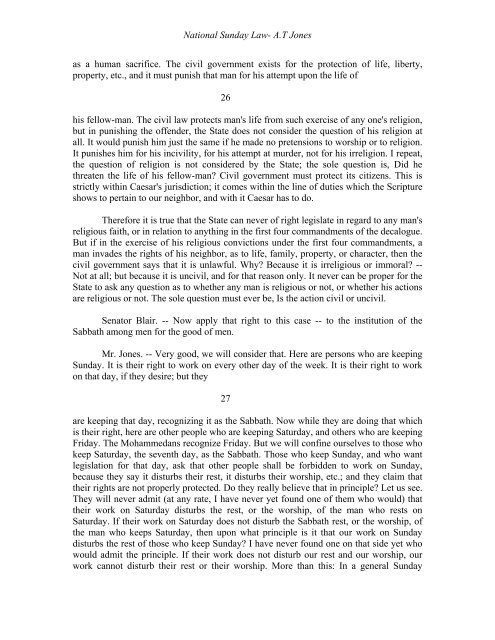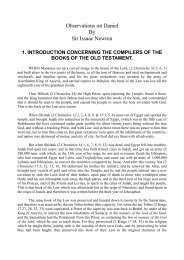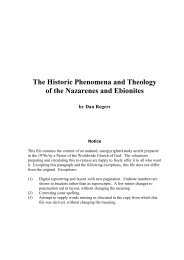THE NATIONAL SUNDAY LAW, ARGUMENT OF ALONZO T ...
THE NATIONAL SUNDAY LAW, ARGUMENT OF ALONZO T ...
THE NATIONAL SUNDAY LAW, ARGUMENT OF ALONZO T ...
Create successful ePaper yourself
Turn your PDF publications into a flip-book with our unique Google optimized e-Paper software.
National Sunday Law- A.T Jones<br />
as a human sacrifice. The civil government exists for the protection of life, liberty,<br />
property, etc., and it must punish that man for his attempt upon the life of<br />
26<br />
his fellow-man. The civil law protects man's life from such exercise of any one's religion,<br />
but in punishing the offender, the State does not consider the question of his religion at<br />
all. It would punish him just the same if he made no pretensions to worship or to religion.<br />
It punishes him for his incivility, for his attempt at murder, not for his irreligion. I repeat,<br />
the question of religion is not considered by the State; the sole question is, Did he<br />
threaten the life of his fellow-man? Civil government must protect its citizens. This is<br />
strictly within Caesar's jurisdiction; it comes within the line of duties which the Scripture<br />
shows to pertain to our neighbor, and with it Caesar has to do.<br />
Therefore it is true that the State can never of right legislate in regard to any man's<br />
religious faith, or in relation to anything in the first four commandments of the decalogue.<br />
But if in the exercise of his religious convictions under the first four commandments, a<br />
man invades the rights of his neighbor, as to life, family, property, or character, then the<br />
civil government says that it is unlawful. Why? Because it is irreligious or immoral? --<br />
Not at all; but because it is uncivil, and for that reason only. It never can be proper for the<br />
State to ask any question as to whether any man is religious or not, or whether his actions<br />
are religious or not. The sole question must ever be, Is the action civil or uncivil.<br />
Senator Blair. -- Now apply that right to this case -- to the institution of the<br />
Sabbath among men for the good of men.<br />
Mr. Jones. -- Very good, we will consider that. Here are persons who are keeping<br />
Sunday. It is their right to work on every other day of the week. It is their right to work<br />
on that day, if they desire; but they<br />
27<br />
are keeping that day, recognizing it as the Sabbath. Now while they are doing that which<br />
is their right, here are other people who are keeping Saturday, and others who are keeping<br />
Friday. The Mohammedans recognize Friday. But we will confine ourselves to those who<br />
keep Saturday, the seventh day, as the Sabbath. Those who keep Sunday, and who want<br />
legislation for that day, ask that other people shall be forbidden to work on Sunday,<br />
because they say it disturbs their rest, it disturbs their worship, etc.; and they claim that<br />
their rights are not properly protected. Do they really believe that in principle? Let us see.<br />
They will never admit (at any rate, I have never yet found one of them who would) that<br />
their work on Saturday disturbs the rest, or the worship, of the man who rests on<br />
Saturday. If their work on Saturday does not disturb the Sabbath rest, or the worship, of<br />
the man who keeps Saturday, then upon what principle is it that our work on Sunday<br />
disturbs the rest of those who keep Sunday? I have never found one on that side yet who<br />
would admit the principle. If their work does not disturb our rest and our worship, our<br />
work cannot disturb their rest or their worship. More than this: In a general Sunday
















